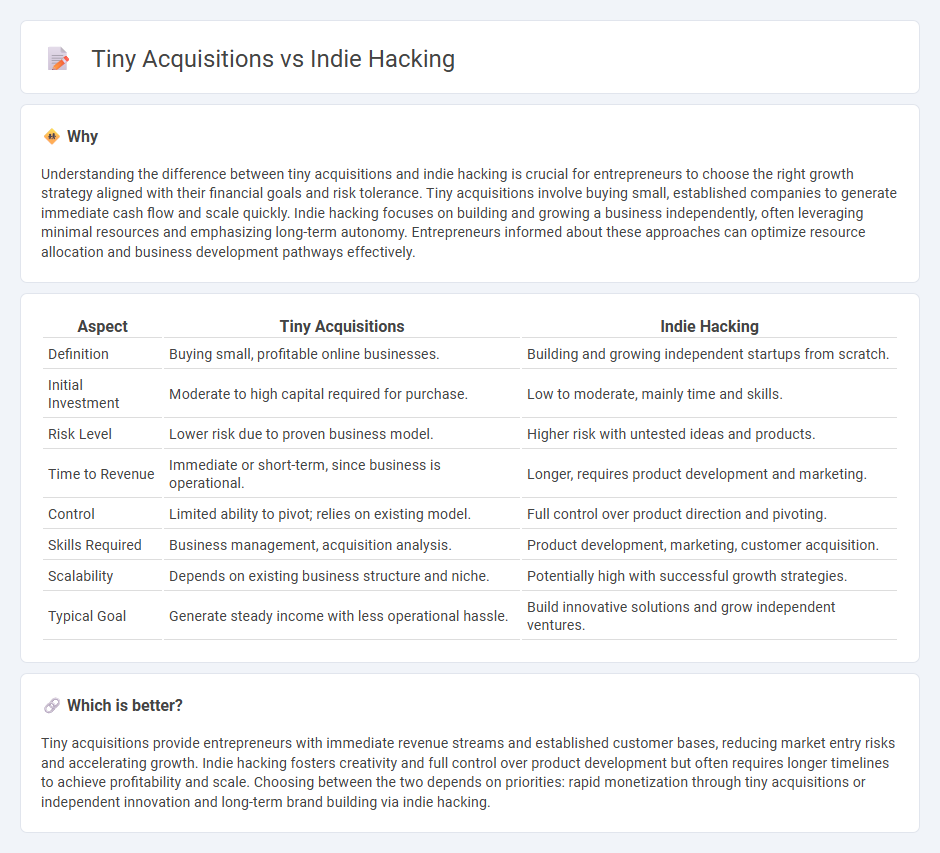
Tiny acquisitions offer entrepreneurs a way to scale quickly by purchasing small, profitable businesses with established revenue streams and customer bases, reducing the uncertainty of building from scratch. Indie hacking emphasizes building startups independently through lean methods, focusing on sustainable growth with minimal external funding and maximum personal control. Explore these approaches to discover which entrepreneurial path aligns best with your goals and resources.
Why it is important
Understanding the difference between tiny acquisitions and indie hacking is crucial for entrepreneurs to choose the right growth strategy aligned with their financial goals and risk tolerance. Tiny acquisitions involve buying small, established companies to generate immediate cash flow and scale quickly. Indie hacking focuses on building and growing a business independently, often leveraging minimal resources and emphasizing long-term autonomy. Entrepreneurs informed about these approaches can optimize resource allocation and business development pathways effectively.
Comparison Table
| Aspect | Tiny Acquisitions | Indie Hacking |
|---|---|---|
| Definition | Buying small, profitable online businesses. | Building and growing independent startups from scratch. |
| Initial Investment | Moderate to high capital required for purchase. | Low to moderate, mainly time and skills. |
| Risk Level | Lower risk due to proven business model. | Higher risk with untested ideas and products. |
| Time to Revenue | Immediate or short-term, since business is operational. | Longer, requires product development and marketing. |
| Control | Limited ability to pivot; relies on existing model. | Full control over product direction and pivoting. |
| Skills Required | Business management, acquisition analysis. | Product development, marketing, customer acquisition. |
| Scalability | Depends on existing business structure and niche. | Potentially high with successful growth strategies. |
| Typical Goal | Generate steady income with less operational hassle. | Build innovative solutions and grow independent ventures. |
Which is better?
Tiny acquisitions provide entrepreneurs with immediate revenue streams and established customer bases, reducing market entry risks and accelerating growth. Indie hacking fosters creativity and full control over product development but often requires longer timelines to achieve profitability and scale. Choosing between the two depends on priorities: rapid monetization through tiny acquisitions or independent innovation and long-term brand building via indie hacking.
Connection
Tiny acquisitions serve as strategic exit opportunities for indie hackers who build profitable, self-sustaining startups with minimal external funding. Indie hacking emphasizes low overhead and rapid product iteration, making startups attractive targets for micro-business acquisitions. This symbiotic relationship fuels a dynamic entrepreneurship ecosystem focused on scalable, bootstrapped ventures.
Key Terms
**Indie Hacking:**
Indie hacking emphasizes building small, self-sustaining businesses through bootstrapped software products or digital tools, prioritizing autonomy and organic growth over external funding. This approach fosters rapid iteration and direct customer engagement, enabling founders to retain full ownership and control. Explore further to understand how indie hacking can empower your entrepreneurial journey.
Bootstrapping
Indie hacking emphasizes creating and growing startups through personal effort and limited external funding, relying heavily on bootstrapping to achieve sustainable, organic growth. Tiny acquisitions involve purchasing small, profitable online businesses, often financed through the revenue generated, allowing for steady income without large upfront investment. Explore the key differences and strategies in bootstrapping within indie hacking and tiny acquisitions to optimize your entrepreneurial journey.
Solopreneurship
Indie hacking emphasizes building and growing a business from scratch through coding, marketing, and continuous iteration, focusing on product development and organic growth by solopreneurs. Tiny acquisitions involve purchasing small, established profitable websites or businesses, allowing solopreneurs to leverage existing revenue streams with minimal setup time and risk. Explore deeper insights into these solopreneurship strategies to decide which path aligns best with your entrepreneurial goals.
Source and External Links
I've been indie hacking for a few months. Here's what I learned. - Indie hacking involves building businesses by engaging deeply with a community, becoming a leader in that niche, providing valuable content, and enjoying the journey rather than focusing solely on the outcome.
Indie Hacking Isn't Dead -- It's Just Less Hacky - Modern indie hacking requires specialized expertise and a specific niche, focusing on solopreneurship and building lifestyle businesses without external dependencies, with evolving monetization models.
Why my indie hacking dreams are dying - This personal account highlights the challenges of indie hacking, illustrating that achieving success is difficult and often requires more than just following existing formulas or emulating others' success.
 dowidth.com
dowidth.com